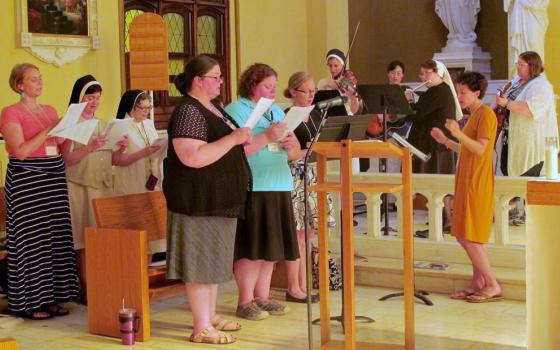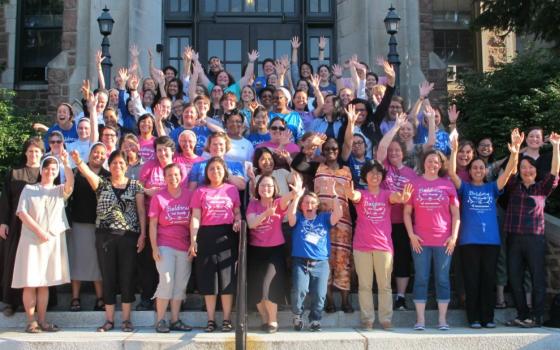I'm scrolling through my Facebook feed nonchalantly when my eyes land on a fascinating headline: "Behold, the Millennial Nuns." I click, slightly apprehensive — because I'm one of them. A millennial nun. What will the author have to say about us, apparently a breed to behold?
The piece is fascinating. Truth be told, some aspects resonate with me, but many don't. My lack of complete concurrence makes sense; we millennial nuns are characterized by wondrous diversity that would be difficult to capture in one article. As Debbie Borneman of the National Religious Vocation Conference likes to say, "If you've met one millennial sister ... you've met one millennial sister."
Regardless, I'm grateful that that author, Eve Fairbanks, a journalist brought up in Virginia and living in South Africa, was curious enough about our way of life to dive into it and lift it up. I admire the courage of the women featured in the article, especially Tori and Mackenzie, who allowed an up-close-and-personal look into their discernment journeys. I love the undercurrent of reflection about new generations of faith in general. And I wholeheartedly endorse the piece's proclamation: Religious life is a still compelling choice for today's young people!
Curious what my peers think, I go to the Facebook group for Giving Voice, a national organization for sisters under age 50, and see commentary about the article already buzzing. Many sisters have mixed feelings like I do; there are elements of the piece that ring true and elements that seem off. However, nearly all highlight that the article about millennial nuns is missing just that — millennial nuns. Fairbanks interviewed two discerners and several seasoned sisters, but we agree that including the voices of millennials who have entered and stayed in religious life would deepen the discussion.
This column is an attempt to add that perspective. To Borneman's point, I am only one millennial sister and in no way claim to be fully representative of "us." I simply offer my story, infused with and inspired by insights from my peers, in hopes that it contributes something to the ongoing conversation.
I first thought about becoming a sister at age 22, while I was an international volunteer with Rostro de Cristo, near Guayaquil, Ecuador. For two years, I lived in faith-based community with other young adults, volunteered with Ecuadorian outreach organizations, grew in relationship with my Ecuadorian neighbors, and learned to see the world, and especially my faith, with new eyes.
Early during the first year, on a weekend beach retreat, I was staring out into the vast ocean, weighing many swirling concerns and wonderings, when five little words popped into my consciousness: "You should be a nun." The thought was startling — disturbing, even. Where did it come from? I had never met a nun anywhere close to my age, and besides, I'd always imagined myself getting married and having a family! I tried to shrug off the idea, but it persisted, arising in prayer and surprising me in everyday encounters.
Eventually, I realized I needed help sifting through my seemingly crazy thoughts. Providentially, Sister Macarena, a trained spiritual director from Spain, moved in down the street. A '90s girl, I loved her name — and I grew to love her as she guided me through Ignatian-style discernment during weekly sessions in her community's little house chapel. Maca helped me to look upon my life in the light of faith and explore my deepest desires without fear. I found I longed for a life centered on a deep relationship with God and poured out for the good of others.
In Ecuador, I had touched into the deep pain and injustice that face so many in our world, and I'd been evangelized by the "poor." I wanted to spend my life walking alongside those people and contributing to the great work of changing the world for the better — the work of the Gospel, of carrying on the mission of Jesus. To my dismay, I realized that my life as a volunteer was similar to contemporary apostolic religious life — and, despite difficulties, it brought me profound joy and deeper meaning than I'd ever before experienced.
When I left Ecuador, I knew I had to continue discerning. I became a lay volunteer associate with the Sisters of Charity of Cincinnati at their discernment house near El Paso, Texas. The sisters, Carol, Janet and Peggy, had hosted me when I came to the border for senior thesis research in 2007. Now, I had come to share in their life and ministry.
I often joke that moving in with them felt like a wildlife show: "Observe the sisters in their natural habitat ..." Lo and behold, I discovered that sisters brushed their teeth, got oil changes, texted, ate popcorn, and got on each other's nerves. At the same time, woven in with this ordinariness was something quite remarkable, something like what I had experienced in Ecuador but firmer and deeper, because this was for life.
We began early each morning with prayer together and then spent the day in ministry — in education, health care, border outreach, young adult ministry, parish ministry, social justice activism, writing, vocation ministry and more, on both sides of the U.S.-Mexico border. For these sisters, religious life was not a refuge from the world, but a devoted, loving integration into it.
In the evenings, we took turns cooking and shared long meals together. On the weekends, we experienced beautiful liturgies in the house chapel and in local parishes, and we held monthly communal reflection days. And we were goofy together, played card games, gardened, took walks, watched "Call the Midwife," and drank wine around the fire pit.
As much as my heart resisted, I was falling in love with religious life. Like the women in Fairbanks' article, I'd been longing for something radical, meaningful and communal — and I was realizing that this could be it.
However, in a real-life plot twist, I also began falling in love with a person at the same time. Steve and I grew close while volunteering together in Ecuador, but it was over phone calls between Boston and the El Paso convent that we realized our bond was deeper than friendship.
When I finally spilled the new romantic development to the sisters in the house, they laughed. "Of course you're falling in love! You're 24." Their tender understanding touched me. They weren't trying to force anything; they truly wanted me to discover God's call.
After months of frequent spiritual direction but no clarity, I felt like I needed to go to Boston and really date Steve. When I worked up the courage to tell the sisters, they laughed again. "Yes, we knew, but we wanted to let you get there on your own." They sent me off with love and total freedom.
Long story short, my time in Boston revealed that although I loved Steve with all my heart, the call to religious life just wouldn't go away. It didn't make sense to me: Steve was everything I would have dreamed of in a husband and more. Our marriage could have been radical, meaningful, mission-centered and rooted firmly in our shared Catholic faith.
But, no matter how much I willed it, I couldn't imagine myself married down the road. Although I'd once dreamed of it, I couldn't readily see myself as a mother. Somehow, it felt like a door was closing on that path, and religious life felt like a big blue sky opening up. Steve told me that I would be a beautiful sister. Ironically, his strong faith helped me claim the call that would take me away from him.
I went back to the border, grieving a real loss, but with time, my heart began to revive and burn with purpose. I remembered why I'd felt so powerfully drawn to religious life. And this time, the call felt sturdy. I had learned that religious life wasn't magic; it wouldn't save me from loneliness, anxiety or self-scrutiny. It wasn't perfect; living with women from different generations and backgrounds was challenging and even painful at times. It wasn't an escape; ministry with the suffering can be exhausting and heartbreaking.
But in its imperfection and my own, there was a sense that this was the life to which God was inviting me. It would involve some sacrifice, yes — what life worth living doesn't? More than anything, it was about joy, love and freedom. When God calls it is to fullness of life.
Life is at the heart of our vows — vows I experience in ways much more nuanced than presented in Fairbanks' article. For myself and many of my peers, entrance into religious life was not a renouncement or rejection, but an embrace — of God, of the Gospel, of our communities and charisms, of the world. Far from leaving our identities behind, on this path of following Jesus, we become more fully ourselves, as a part of something way bigger than ourselves, for the good of the world. Rather than a collection of noes, the vows express our heart full of "Yes!" to Christ. They are freely chosen and freeing.
Celibacy is a yes to loving God and God's people singularly, freely and inclusively. It's about striving for right relationship in our communities and our ever-widening circles of connection.
Poverty is a yes to downward mobility, simplicity, holding things in common and recognizing all as gift to be shared. It is about depending fully on God and working for justice so that no one will be poor.
Obedience is a yes to listening deeply to God and one another and following God's call with courage and single-hearted devotion. It is about authentic interdependence and being responsible to the suffering people in our world. The "Yes!" of our vows is wider and deeper than could ever be expressed in this column.
People are certainly still saying that "Yes!" According to the National Religious Vocation Conference, in 2018, 440 women and men entered religious life in the United States, and 240 women and men made final vows. A good number of newer members are millennials, but not all. Gen X women are entering religious life and have been for decades, often without the attention and recognition that surrounds the newer cohorts. Soon, the centennials (or Gen Z, or iGen, or the homelanders) will be entering our congregations.
Charity Sr. Pat Wittberg, a sociologist, says generation has a monumental impact on how one approaches life, but at the same time, generations blur with one another and vary internally based on geography, race, culture, family and personal experiences. While U.S. religious life has been largely "white," despite ministering for years in communities of color, it is finally beginning to reflect the population, racially and ethnically. This is the gift and challenge that newer generations bring: a global vision and a call to confront racism and grow toward interculturality.
We'll learn more about what's unfolding in religious life from the National Religious Vocation Conference's forthcoming 2020 study, but we can say one thing with certainty: There is no stereotypical discerner or sister.
These diverse newer members are drawn to a diversity of charisms. 2018's new religious entered 177 different institutes, "progressive" and "conservative" and everything in between. As Fairbanks names, millennials are characterized by seeming contradictions: A "traditional" nun in a habit protests publicly for immigration reform. A sister in a "liberal" congregation finds deep solace in eucharistic adoration. We are drawn to both spirituality and activism, to innovation and tradition, to piety and justice. We long for intentional integration of our entire lives.
And, truthfully, we don't care to focus on what divides us. We hope to witness to the beauty of unity in diversity. Wittberg calls this the "Baskin-Robbins 31 flavors" nature of religious life; each of the distinct charisms attracts different members and is urgently relevant for the complex mission of the church in the 21st century.
The bottom line to behold is this: God is still calling, and people are still responding. All of our unique stories, millennial nuns and journalists and everybody, are about God's eternal love expressed in myriad ways. It's a beautiful mystery.
I love how Fairbanks ends her article with the image of Mackenzie "climb[ing] further to seek the God that she loved." It reminds me of Mother Abbess' iconic urging for Maria to "Climb Ev'ry Mountain" in "The Sound of Music." She knew that every vocation holds the promise of God's fidelity, the mark of holiness and the power to build up the reign of God. In the end, the journey is about finding the "dream that will need all the love you can give, every day of your life, for as long as you live."
[Tracy Kemme is a Sister of Charity of Cincinnati who authored the blog Diary of a Sister-in-Training during formation. After a decade in social justice and Hispanic ministry, she is working toward her master's degree in pastoral ministry at Catholic Theological Union in Chicago.]


